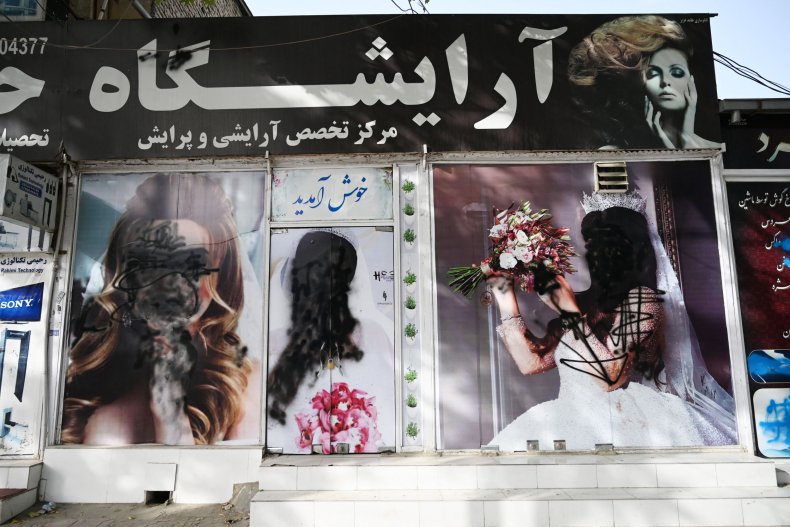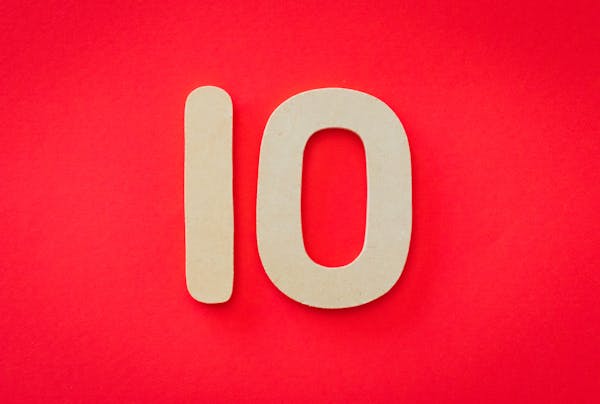On the evening of Aug.15, 2021, while on my way home, my heart was pounding against my chest. I told my friend, who was driving the car, to speed up so we can get home quickly. It was dusk and the streets of Kabul were empty. In the Shahr-e Naw area of Kabul a few gunmen in civilian attire glared at us as we passed by.
Kabul was no longer the same city it was a few days ago. All the streets were empty and the shops were closed. As I passed through the main thoroughfare of Shahr-e Naw, I noticed that the images of beautiful models adorning the windows of the posh beauty salons and chic boutiques lining the streets of this area, also known as Kabul’s Times Square, had been freshly covered in white paint, the color of the Taliban flag.
I was the deputy director of operations for TOLONews, Afghanistan’s largest and most reputable news network. During that evening’s 6 p.m. newscast we reported that former President Ashraf Ghani had fled Afghanistan and that the Taliban were expected to enter Kabul that very evening. I was trembling while I rushed to complete the rest of my duties to hurry home.
At home, everyone was concerned and no one was able to predict what would happen in the next few minutes. My four children, who regularly watched television, had switched off the TV and joined in worrying with the rest of the family. My mother and the rest of my family members began going through items in our home to find and destroy anything that might be considered against the Taliban’s wishes, giving them an excuse to harass us. We kept all the lights in the house off except for the kitchen light.
Although we left our own house a few days prior to hide temporarily in a new home, we were still afraid that the Taliban would find us. It was around 8 p.m. when the Taliban entered Kabul with horrific gunfire, and we secretly watched them roll through Kabul from the balcony.
The First Days
Kabul, which had experienced 20 years of democracy and development, enjoyed free media, nurtured artists and filmmakers, where thousands of women fought for their political and civil rights and freedoms, suddenly returned overnight to a darkness that no one predicted.
I tried to shake off this feeling of being in a nightmare. We lost Afghanistan and everything we had built.
That evening, those of us on the TOLONews management team jumped on an impromptu conference call and decided to instruct our female journalists not to come to the office the next day. Our broadcasts would be presented by men.
That same night, many television stations that normally broadcast entertainment programming, dramas and music videos, changed to religious programs that included Islamic tales, recitations of the Koran and Islamic dramas. Dozens of other media outlets stopped airing completely.
The next day, with confirmation from our colleagues who had direct telephone contact with the Taliban attesting that we were safe, we returned to the office. We resumed airing our reports despite the fact that they were broken and choppy and we took a conservative approach to airing news regarding the presence of the Taliban throughout Kabul. We tried our best to refrain from broadcasting anything against them. That afternoon, a group of 20 heavily armed Taliban entered our studios at Moby Group’s Wazir Akbar Khan compound. At first, our staff were terrified and frantic, until they realized that their intent was just to register the weapons in possession of our security team.
In an effort to combat the situation, we decided at our management meeting to ask the female journalists and staff to return to work the next day, especially since we had received confirmation from the Taliban that our female staff could return and they would not interfere with our work.
On the second day after the Taliban’s arrival in Kabul, our female journalists were reporting from every corner of the city, presenting the news from our studios and interviewing guests on live TV. My colleague, Behishta Arghand, sat across from a Taliban representative and conducted a live interview, garnering the attention of the international media.
Immediately after this, the Taliban, directly and indirectly, began imposing restrictions on media coverage, contrary to their previous commitment. Unidentified members of the Taliban regime contacted our colleagues and sent threatening messages. Zabiullah Mujahid, the Taliban spokesperson, expressed his disapproval of the type of hijab or head coverings our female colleagues wore on screen and demanded that they cover in the similar style of hijab that could be seen on female news reporters in Iran’s media outlets.
Further, the Taliban started visiting the homes of our colleagues, looking for them. Fortunately, all of our staff relocated from their homes. The Taliban were unsuccessful in capturing any of them. However, their telephone threats continued. Men affiliated with the Taliban visited my home twice and inquired about my whereabouts.
My mother immediately called me and told me not to come home. I ended up staying in the office instead of going home. My colleague who was in touch with the Taliban’s spokesperson told him about my situation. The spokesperson gave excuses that those individuals were probably not affiliated with their group and were just taking advantage of the situation and promised to follow up on the matter.
I was instructed by the acting director of TOLONews to warn a number of my female colleagues to “fix” their hijab. Behishta Arghand was the first female news presenter who was responsible for presenting the Pashto news those first two days. When I told her about the Taliban’s decree regarding her hijab, she broke down sobbing and told me that she knew all this was just an excuse and women would no longer be able to work. Arghand was the sole breadwinner for her family.
We Resisted
Despite public assurances that freedom of expression and media would be protected, the Taliban never proved that they could accept criticism. During their third day in power, the group’s spokesperson first appeared on television and held a press conference where he became visibly upset by a question from my journalist colleague, Khalid Nikzad. Nikzad asked Zabiullah Mujahid, “You killed a lot of innocent people with explosives and suicide bombs, and now you say that we have forgiven everyone. Do you think people will forgive you?” Mujahid reluctantly gave a brief response but became angry and refused to answer Khaled Nikzad’s follow-up question on whether they were ready to apologize to the people.
After the press conference, Mujahid was scheduled to meet with TOLONews management. After Nikzad’s questions, he cancelled the meeting and refused to take any calls from our reporters over the next couple of days.
Threats and dangerous work conditions for journalists imposed by the Taliban were recorded and one after another, the journalists of TOLONews began fleeing Afghanistan, becoming refugees.
But we resisted and fought to play a part in preserving the achievements of the last 20 years. For two more weeks, we continued our work. During this period, we tried to refrain from criticizing the Taliban in order to appease them. However, it became clear that their resentment toward us ran very deep and our efforts were proving fruitless.

WAKIL KOHSAR/AFP via Getty Images
Threats made against our journalists, harassment and violence against our reporter in Kabul’s Shahr-e Naw continued as did indirect telephone threats to our employees and restricting access to information. We faced these challenges each passing day; further restricting freedom of expression. A Talib told one of our reporters, “We fought for 20 years because of TOLO and now you question us as an Israeli television station?”
Since I was mostly spending my days and nights in the office, many of my colleagues would share stories and information they gathered with me. One told me that Khalil Ur Rahman Haqqani, the newly appointed head of security for Kabul, carries M4 weapons with him in all his meetings with political leaders. Haqqani is blacklisted by the United Nations and the U.S. State Department. The United States also offered a $5 million reward for information leading to his capture.
My colleague continued to tell me that Haqqani, in all his meetings, first prays for the souls of all those who have carried out suicide attacks in favor of the Taliban in the last 20 years. He takes with him five individuals identified as suicide attackers to all meetings and introduces them to politicians. Since the security of Kabul is the responsibility of the Haqqani network, my colleague also said that the Department of Protection and Security of High Officials has become the center of the fidayeeha or “the devoted” and all those who are ready to carry out suicide attacks are present in this center and ready for their command to carry out attacks.
On the other hand, access to information was becoming more limited as each day passed. The Taliban would only grant us access to information they wanted us to report on. Their officials wouldn’t grant us permission to look into anything for investigative reports and we were kept away from facts and truths.
“My Heart Wants to Shoot You All”
I can confidently say that what is being reported from inside Afghanistan is only a small fraction of what is actually happening there. Media outlets have no access to evidence of the crimes that the Taliban are committing or they cannot publish out of fear of reprisals. There was material that we self-censored ourselves on reporting out of fear of persecution, such as the looting of the American University, the door-to-door searches of homes by the Taliban, war crimes committed in Andarab and Baghlan, criticism of the Taliban’s management of Kabul Airport and dozens of other issues.
Restrictions on freedom of expression and media and the Taliban’s constant threats made me and other journalists feel like we were being held hostage. The Taliban expect that the media should only serve as a propaganda tool for them. Meanwhile, it’s very easy for the Taliban to send anonymous assassins to murder journalists and claim that ISIS was behind it to protect themselves.
I made the decision to save my life and the lives of my family at any cost and no longer be a hostage of the Taliban. Under extreme fear and difficulty we were able to make our way to Mazar-i-Sharif and connect with a number of other journalists to wait together near the shrine of Sakhi for the international community to evacuate us out of the country.
For days the Taliban refused to grant us permission to enter the airport and clear our plane for departure. Finally, with the intervention by a senior U.S. official, the Taliban allowed us to enter the airport, board our flight and leave the country.
At the first Taliban checkpoint in the Mazar-i-Sharif airport, one of their commanders, who was in charge of escorting us into the airport, told me, “My heart wants to shoot you all,” because he thought we all worked for foreigners, especially for Americans. He continued, “But at the moment, I am bound by the orders of my superiors to let you go and I have no choice. Whenever the opportunity arises, I will shoot all of you and fulfill my dream, because by killing you, we will become victors.”
There were a total of 175 people, including women and children, who flew out of Mazar-i-Sharif to Mexico before the Taliban commander could achieve his dream.
From the behavior of the Taliban that I witnessed over those two dark weeks and hearing the words of a Taliban commander in Mazar-i-Sharif, I fully believe that the Taliban are the same terrorists of the past. They have not changed and they will never change. Their brand has always been and will always be violence and murder.
Now that I hear talks about recognizing the Taliban, I fear that if they are officially recognized by the United States and other countries, they will be the first terrorist group in history to be recognized by global powers as representatives of an official government. It was evident that their actions contradicted their promises of change.
I urge the international community to hold the Taliban accountable to their supposed promises and make that a condition of their official recognition.
Abdul Farid Ahmad is former deputy operations director of TOLONews.
The views expressed in this article are the writer’s own.






